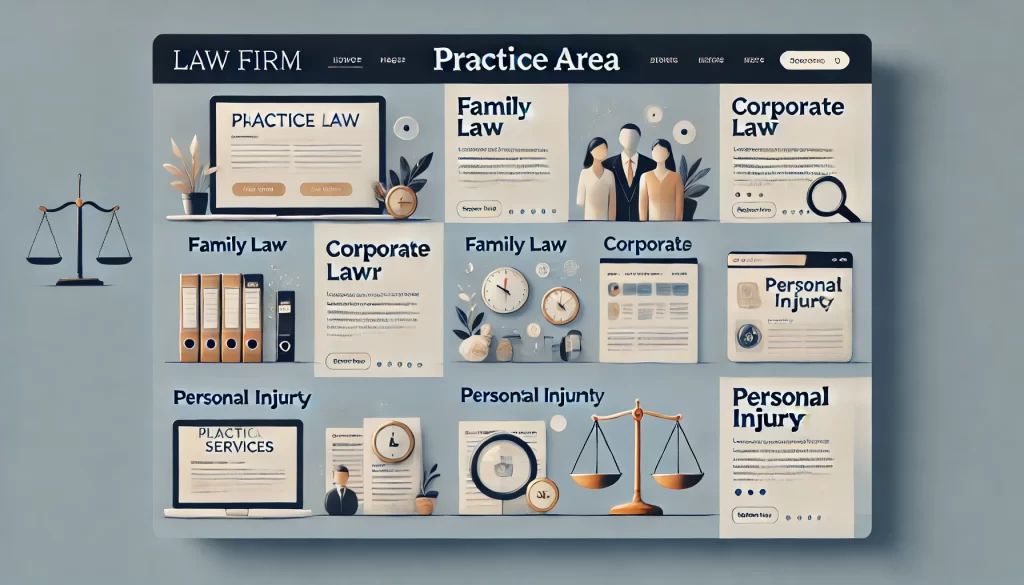Introduction
In today’s digital age, having a well-designed, professional website is not just an option—it’s a necessity for any law firm aiming to establish credibility and attract clients. A law firm website serves as your online business card, a resource hub for prospective clients, and an essential tool for building trust. For law firms, a website is more than just an aesthetic platform; it’s a critical part of your marketing strategy that helps establish your authority, showcase your expertise, and ensure potential clients can easily find you.
Whether you’re a small firm just getting started or a large, established law firm aiming to update your online presence, creating a well-thought-out website can significantly enhance your firm’s visibility and credibility. In this article, we’ll explore what makes a successful law firm website, key features to include, and provide some examples for inspiration.

Key Features of Law Firm Websites
A law firm website should serve multiple functions, ranging from providing legal information to helping convert visitors into clients. To achieve this, certain key features are essential for both functionality and user experience. Here’s a breakdown of the most important elements to consider when building your law firm website:
Related Posts
Practice Areas
Your website must communicate the areas of law your firm specializes in. This is one of the first things prospective clients will look for, as it helps them determine whether your firm is suited to handle their specific legal needs. Be sure to have a dedicated section outlining each of your practice areas, including short descriptions, notable cases or successes, and any certifications or recognitions your firm holds in these areas.
For example, if your firm specializes in personal injury, family law, or corporate law, create a separate page for each practice area. This not only provides clarity but also allows for easier navigation for visitors seeking specific legal assistance.
Lawyer Bios
Potential clients want to know who will be representing them. Your website should have detailed biographies of the lawyers at your firm, showcasing their credentials, areas of expertise, and professional accomplishments. Include photos of your lawyers to humanize the experience and make clients feel more comfortable.
Each bio should be professional, yet personable. Include their experience in your practice areas, educational background, and any notable cases they’ve worked on. Adding a personal touch by discussing their motivation for practicing law or their dedication to client care can also help build trust.
Contact Forms and Clear Call-to-Actions (CTAs)
An essential feature for any law firm website is the ability to easily contact the firm. This can include simple contact forms, phone numbers, and email addresses prominently displayed across the site. A potential client shouldn’t have to dig around for your contact information—it should be easy to find.
Effective CTAs (calls-to-action) are crucial for conversion. After potential clients have read through your practice areas and lawyer bios, they should have an easy way to take the next step, whether that’s scheduling a consultation, calling your office, or requesting more information. Use action words like “Schedule Your Free Consultation,” “Get Legal Help Today,” or “Contact Us Now” to prompt immediate action.
Client Testimonials and Case Results
Testimonials from satisfied clients or successful case results can significantly enhance the trustworthiness of your law firm website. Highlighting positive reviews and case outcomes demonstrates your firm’s experience and success rate, helping build credibility with potential clients.
Consider including a dedicated testimonials page or embedding reviews throughout your site, especially on landing pages like those for specific practice areas. Case studies and success stories can also provide real-life examples of how your firm has helped clients.
Mobile Responsiveness
In today’s mobile-first world, your law firm website must be mobile-friendly. Many users will be browsing your website on their smartphones, and if it’s not responsive or easy to navigate on smaller screens, you risk losing potential clients. A mobile-optimized design ensures that your site looks great and functions properly across all devices.
Blog and Legal Resources
A blog or legal resources section is another valuable feature for your website. Not only does it allow you to showcase your expertise, but it also provides clients with useful information they can reference. Regularly publishing articles about common legal issues, new legislation, or case studies can help your website rank higher on search engines and demonstrate your knowledge to potential clients.
Including articles that answer frequently asked questions (FAQs) or clarify legal processes can also make visitors feel more informed and confident about your firm’s abilities.

Examples of Well-Designed Law Firm Websites
To give you some inspiration, here are a few well-designed law firm websites that successfully implement the features we’ve discussed:
Example 1: The Green Law Firm
The Green Law Firm’s website is a great example of a clean and professional design that makes it easy for clients to navigate. Their website features clear practice area pages, detailed lawyer bios, and a prominent CTA for free consultations. They also include testimonials from satisfied clients, which helps build trust right away.
Related Posts
Example 2: Miller & Associates
Miller & Associates’ website stands out with its interactive design and user-friendly features. They have an easy-to-find contact form, clear navigation, and a blog section that is regularly updated with helpful legal tips. The site is also fully mobile-responsive, which ensures a great experience for visitors on all devices.
Example 3: Legal Experts Group
Legal Experts Group has a sleek, modern website with great use of white space and professional photography. Their lawyer bios include detailed information about each lawyer’s qualifications, which helps establish authority. They also have a client portal for easy document sharing, further streamlining the user experience.
Contact Us for Custom Law Firm Website Design
If you’re looking to create a professional, user-friendly website for your law firm, we’re here to help. Our experienced team specializes in designing custom law firm websites that not only look great but also function perfectly for your unique needs. From practice area pages to attorney bios and lead-generation tools, we can help you create a site that builds trust, showcases your expertise, and converts visitors into clients.
Contact us today to get started on designing your custom law firm website!
FAQs
Why does my law firm need a professional website?
A professional website helps establish your firm’s credibility, provides easy access to important information, and acts as a powerful tool for attracting new clients.
What features should a law firm website have?
Key features include clear practice area pages, detailed lawyer bios, contact forms, client testimonials, and mobile responsiveness.
How can I make my law firm website stand out?
Focus on clean, user-friendly design, clear calls-to-action, and valuable content like legal blog posts or client success stories.
Is mobile optimization important for a law firm’s website?
Yes, with more users browsing websites on mobile devices, ensuring your website is mobile-responsive is essential to maintaining a positive user experience.
How can I use client testimonials on my law firm website?
You can highlight client testimonials on practice area pages, a dedicated testimonials page, or alongside your lawyer bios to enhance credibility and trust.
Key Takeaways
A well-crafted law firm website is a vital tool for establishing authority, attracting clients, and showcasing your expertise. By incorporating essential features like clear practice areas, lawyer bios, easy contact options, and client testimonials, your website can become a powerful asset for your firm. Look to the examples mentioned for inspiration, and remember that a professional, mobile-friendly design can set you apart from your competitors.
- Key features of a law firm website include practice areas, lawyer bios, client testimonials, and easy-to-find contact forms.
- Well-designed law firm websites focus on user experience, clear navigation, and conversion-oriented CTAs.
- Regular blog posts and legal resources help build your firm’s authority and improve SEO.
